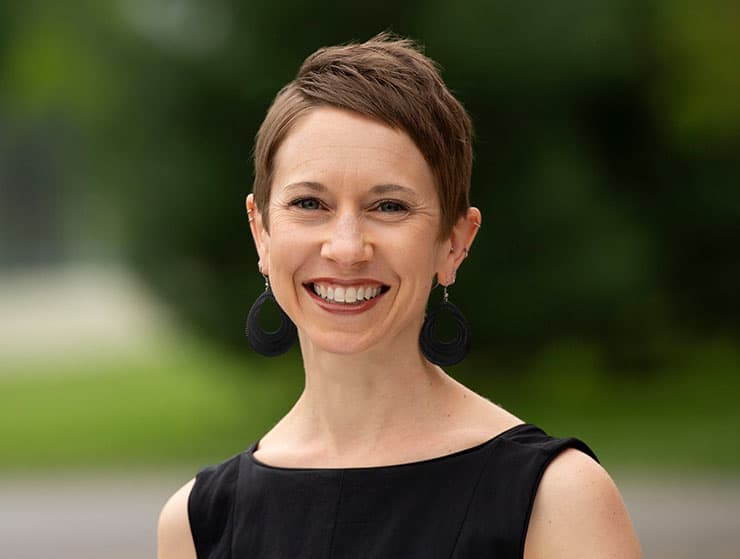“Literature offers us a valuable way of understanding the world, for it both provokes conversation about and deepens our understanding of what it means to be human beings. In my classes, I hope that students gain an appreciation for diverse lifestyles, cultural backgrounds, and ways of thinking about themselves, their world, and their writing. They have the chance to use their education to create positive change in the world, and a fundamental part of doing so is being able to read analytically and communicate effectively.”
Title
Assistant professor of English; chair, English department; head, humanities division
Educational Background
- Ph.D., Vanderbilt University – Nashville, TN
- M.A., University of Tennessee – Knoxville, TN
- B.A. and B.S., Presbyterian College – Clinton, SC
Study abroad in London, England
Year joined Franklin
2008
Expertise
British and French medieval literature, Shakespeare, advanced grammar, composition pedagogy
Why did you choose to study and teach medieval literature?
Medieval literature is delightfully surprising. So many people think of medieval literature as stories about knights rescuing damsels in distress, but the literature of the period is quite diverse both in topic and in form. It is actually not uncommon for the damsels to wield more power than the knights! Medieval literature is concerned with many of the same topics we grapple with today–gender roles, identity, political and economic power, relationships–and therefore studying this era allows us to learn a lot about ourselves and our modern society.
Why do you use the flipped classroom to teach composition?
The flipped classroom, where students learn material via video lecture outside of class and then use the time in the classroom to practice skills, works really well for writing classes. Accessing new material via short video lectures offers advantages to students because they are able to take notes at their own pace by starting and stopping the videos as needed, and they are able to re-watch the videos as many times as they need to over the course of the semester. My research has shown that the flipped model increases students’ abilities to understand and apply important composition concepts because the students get more time to workshop their writing in the classroom; the dedicated time to practice skills and to get feedback within the classroom leads to greater mastery of skills over the course of the semester.
How can I convince my parents that majoring in English and creative writing will help me get and keep a job?
In a 2013 study conducted by the Association of American Colleges and Universities, 92% of the employers surveyed indicated they value innovation in the workplace, and 93% noted that they value a potential employee’s ability to think critically, communicate clearly, and solve complex problems more than they value the employee’s major. Our English and creative writing curricula help students develop all four of those highly valued skills, and in doing so, they prepare our graduates for careers in a wide variety of fields, everything from marketing to communications, from non-profit management to publishing. In addition, by building transferrable skills, rather than training for one specific job, our graduates are prepared to adapt to the rapidly changing workplace. Our majors are required to take a professional development course at the same time that they do an internship. Both experiences help our majors learn how to make connections and be successful on the job market.
Selected Professional Accomplishments
Selected Publications
“Flipping the Writing Classroom.” Implementation and Critical Assessment of the Flipped Classroom Experience. Ed. Abigail G. Scheg. Hershey, PA: IGI-Global, 2014.
“‘Wommen, of kynde’: the Construction of the ‘Natural’ and ‘Unnatural’ in Chaucer’s Gardens.” Under revision for The Chaucer Review
“Charles d’Orleans.” The Facts on File Companion to British Poetry before 1600. Ed. Michelle M. Sauer. New York: Facts on File, 2008.
Selected Presentations
Pre-conference Workshop Facilitator, “Flipping the Composition Classroom: Philosophy, Pedagogy, Praxis, and Production,” with Chris Friend and Christina Grimsley. Conference on College Composition and Communication, Indianapolis, IN. March 2014.
Invited presenter, “Inverted Classrooms: the Future of Education,” The Pennsylvania State System of Higher Education Virtual Conference, online. February 2013.
“Inverted Classrooms: The Future of Education,” The Teaching Professor Conference, Washington, DC. June 2012.
“The Inverted Writing Classroom: the Future of Education,” Conference on College Composition and Communication, Las Vegas, NV. March 2013.
“Reinventing Composition with Civic Engagement,” Conference on College Composition and Communication, Louisville, KY. March 2010.
“The ‘craft of mannes hand’ in Arveragus’s Garden,” Modern Language Association Conference, Washington, DC. December 2010.
“Lessons from Medieval Literature on Our Modern Environmental Crisis,” Sixth Biennial Association for the Study of Literature and Environment Conference, Eugene, OR. June 2005.
“Power, Enclosure, and Gendered Space in the Romance of the Rose,” 39th International Conference on Medieval Studies, Kalamazoo, MI. May 2004.
“Taming the Wild Woman: Conquering Nature and Confining Women in the Arthurian Court,” Southeastern Medieval Association Conference, Tallahassee, FL. September 2002.
Honors
Nominee, U.S. Professor of the Year, 2015
Clifford and Paula Dietz Award for Faculty Excellence, 2014
Academic Advisor Award, 2012
Thomas Daniel Young Award for Distinguished Teaching, 2006
Selected Professional Experience
Member, Strategic Planning Task Force
Coordinator, Humanities Undergraduate Research Initiative
Coordinator, English Department Program Review
Chair, Faculty Handbook Committee
In My Spare Time…
In my spare time I am a Girl Scout troop leader for twenty-five Brownies (second- and third-graders), one of whom is my daughter. I was a Girl Scout myself, as were my mother and sister, so Scouting is an important tradition in my family. Girl Scouts helped transform me from a painfully shy child into a confident, comfortable adult and gave me opportunities to expand my education and understanding of the world outside a traditional classroom. I volunteer because I want to help provide the same life-changing opportunities to the next generation.
